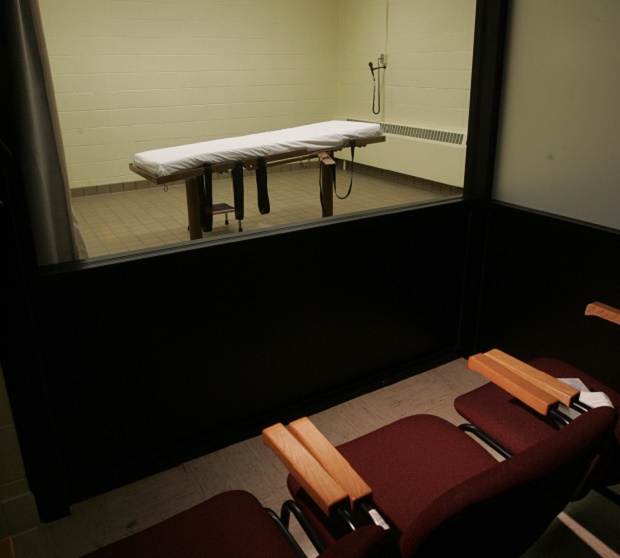Ohio delays executions until 2017 over lack of lethal drugs

This Nov. 2005 file photo shows the death chamber at the Southern Ohio Corrections Facility in Lucasville, Ohio. On Monday, Oct. 19, 2015, officials from the Ohio Department of Rehabilitation and Correction announced a two-year delay in capital punishment as the state struggles to obtain lethal injection drugs, after Gov. John Kasich issued warrants of reprieve postponing executions of a dozen inmates until at least 2017. AP FILE PHOTO
COLUMBUS, Ohio — Ohio is putting off executions until at least 2017 as the state struggles to obtain supplies of lethal injection drugs, delaying capital punishment for a full two years, the prisons department announced Monday.
Ohio has run out of supplies of its previous drugs and has unsuccessfully sought new amounts, including so-far failed attempts to import chemicals from overseas. It’s just one of several states scrambling to obtain drugs for executions, since European pharmaceutical companies began blocking the use of their products in lethal injections.
Execution dates for 11 Ohio inmates scheduled to die next year and one scheduled for early 2017 were all pushed into ensuing years through warrants of reprieve issued by Gov. John Kasich.
The result is 25 inmates with execution dates beginning in January 2017 that are now scheduled through August 2019. Ohio last put someone to death in January 2014.
The new dates are needed to give the prisons agency extra time, the Department of Rehabilitation and Correction said in a statement.
Article continues after this advertisementThe agency “continues to seek all legal means to obtain the drugs necessary to carry out court ordered executions, but over the past few years it has become exceedingly difficult to secure those drugs because of severe supply and distribution restrictions,” the statement said.
Article continues after this advertisementLast week, the attorney general’s office in Oklahoma announced no executions will be scheduled until at least next year as the office investigates why the state used the wrong drug during a lethal injection in January and nearly did so again last month.
Earlier this month, an Arkansas judge halted the upcoming executions of eight death row inmates who are challenging a new law that allows the state to withhold any information that could publicly identify the manufacturers or sellers of its execution drugs.
On Oct. 1, Virginia executed serial killer Alfredo Prieto, but only after obtaining pentobarbital from the Texas prison system. Texas has continued to purchase supplies of compounded pentobarbital without saying how much it has obtained or where it came from.
At Ohio’s last execution in 2014, condemned killer Dennis McGuire repeatedly gasped and snorted during a 26-minute procedure, the longest in Ohio history, as a new two-drug combo was used.
The next execution was scheduled for Jan. 21 when Ronald Phillips was to die for raping and killing his girlfriend’s 3-year-old daughter in Akron in 1993. Phillips’ execution was rescheduled for Jan. 12, 2017.
The handwriting has been on the wall for months that Ohio would have to make such a move, said Franklin County Prosecutor Ron O’Brien, expressing his frustration at a new set of delays.
These delays come in cases where inmates have long exhausted their appeals and there’s no question of their guilt, he said.
“It seems that in those states that authorize assisted suicide, there has been no impediment to securing drugs, and as time marches onward, victims wonder why they must continue to wait for justice,” O’Brien said in an email.
Ohio abandoned the two-drug method after McGuire’s execution and announced it would use either of two older drugs that it had previously obtained for capital punishment, but did not currently have supplies of.
One of those drugs, sodium thiopental, is no longer manufactured by FDA-approved companies and the other, pentobarbital, has been put off limits for executions by drug makers.
Ohio obtained a federal import license to seek supplies overseas, but has been told by the FDA that such a move is illegal. Ohio raised the issue again with the FDA earlier this month, asserting the state believes it can obtain a lethal-injection drug from overseas without violating any laws. The FDA has yet to respond.
RELATED STORIES
Lethal injections face scrutiny after two-hour US execution
US to execute woman despite pope appeal